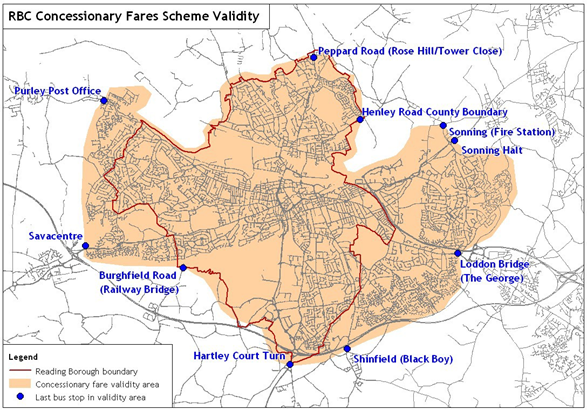Concessionary fares scheme 2024 – 25
1. Introduction
2. Changes to scheme
3. Concession to be provided by participating operators
4. Persons eligible to receive concessions
5. Assessing eligibility – disabled persons access pass and companion entitlement
6. Area of validity
7. Admission dates
8. Eligible services
9. Standard method of reimbursement
10. Exceptions to the standard method of reimbursement
11. Payment arrangements and information to be provided by participating operators
12. Drivers’ obligations
13. Other matters
Schedule 1
Schedule 2
Schedule 3
1 Introduction
1.1 This document describes the Reading Borough Council Concessionary Fares Scheme (“the scheme”) and is issued pursuant to the requirements of Sections 93 and 95 of the Transport Act 1985, the Travel Concessions Schemes Regulations 1986, the Travel Concessions (Eligibility) Act 2002, the Travel Concessions (Extension of Entitlement) (England) Order 2005 and the Travel Concessions (Eligibility) (England) Order 2010. The scheme complies with the requirements of the Transport Act 2000, as modified by the Concessionary Bus Travel Act 2007, in respect of the English National Concessionary Travel Scheme (ENCTS).
2 Changes to scheme
2.1 There are no changes to Reading Borough Council’s concessionary fares scheme from 2023-24 to 2024-25.
3 Concession to be provided by participating operators
3.1 The statutory Minimum Requirement is to offer ENCTS pass holders;
- FREE travel on any local bus service within England at all time on Saturday, Sunday and Bank Holidays and between 09:30 and 23:00 on any other day.
- Claims for reimbursement against Reading Borough Council should only be made for trips originating within the Borough of Reading, as shown in Schedule 1.
3.2 Whilst operators may seek to appeal against reimbursement arrangements proposed by any Travel Concession Authority (TCA), such as Reading Borough Council, they are obliged to carry eligible pass holders during the above periods of time.
3.3 Discretionary Enhancements
In addition to the Statutory Minimum Requirement, Reading Borough Council offers discretionary enhancements under the Transport Act 1985. Operators are requested to participate in the provision of the following discretionary enhancements;
3.3.1 Holders of current Reading Borough Council issued ENCTS eligible disabled ‘Access’ passes (as shown in Schedule 2, or as subsequently modified by the Council) are to be permitted travel without payment of fare on journeys made by local bus services starting within the Borough of Reading (as shown in Schedule 1) between the hours of 00:00 and 09:30 Mondays to Fridays and the hours of 23:00 and 23:59 Mondays to Fridays. Outside of these times, the Statutory Minimum Requirement applies.
3.3.2 Certain holders of Reading Borough Council issued ENCTS eligible disabled ‘Access’ passes are entitled to be accompanied, and have been provided with a Companion entitlement on their Reading Borough Council issued ENCTS disabled ‘Access’ pass (as shown in Schedule 2, or as subsequently modified by the Council). Companions travelling with the pass holder are to be permitted to travel without payment of charge on local bus journeys commencing within the area of validity at any time that the main pass holder is eligible to travel. This entitlement applies to a single companion travelling with the pass holder.
3.3.3 Reading Borough Council also permits the Companion of holders of current ENCTS eligible disabled passes who have been granted Companion entitlement by another pass issuing authority travel without payment of fare on journeys made by local bus services starting within the Borough of Reading (as shown in Schedule 1) within the hours of the Statutory Minimum Requirement. Passes are valid only on local bus services and may not be used on other modes of travel.
3.3.4Holders of any current Reading Borough Council issued ENCTS pass and unable to use public transport are to be permitted to travel without payment of fare on dial-a-ride journeys made by ReadiBus (excluding excursions, tours and other private hire arrangements). Pass holders must first register with ReadiBus and journeys covered must have an origin or destination within the Borough of Reading. Passes are valid every day without time restriction.
3.4 Operators must notify the Council of any desire not to participate in any non-statutory (discretionary) elements of the scheme, giving 42 days’ notice of their decision not to participate.
4 Persons eligible to receive concessions
4.1 Eligibility Criteria
Reading Borough Council will issue a permit, free of charge for initial issue or renewal, on application by any person who appears to be a permanent resident of Reading and who is either:
- An Older Person, i.e. a man or woman who has reached the age at which a woman born on the same day becomes eligible to receive the State Pension, or
- A Disabled Person, i.e. a person of fare-paying age who has a qualifying disability as specified in the legislation and interpreted in accordance with statutory guidance.
- Certain Disabled Persons, who may require assistance to travel by bus, may also be granted a permit with additional companion entitlement.
4.2 Older Person Eligibility Criteria
The eligibility age for an Older Persons Pass is the same for both a man and a woman. The age at which a man or a woman is eligible is rising in line with the women’s state pension age. Applicants are advised to use the DirectGov tool (link below) to calculate the date at which they become automatically eligible for an Older Person’s Pass.
4.3 Disabled Persons Qualifying Criteria
To qualify for a Disabled Persons ‘Access’ Pass, persons permanently residing in the Borough of Reading must also meet one of the seven categories as set out in section 151(4) of the Transport Act 2000 and listed below:
a. Is blind or partially sighted;
b. Is profoundly or severely deaf;
c. Is without speech;
d. Has a disability, or has suffered an injury, which has a substantial and long-term adverse effect on his ability to walk;
e. Does not have arms or has long-term loss of the use of both arms;
f. Has a learning disability, that is, a state of arrested or incomplete development of mind which includes significant impairment of intelligence and social functioning;
g. Would, if he/she applied for the grant of a licence to drive a motor vehicle under Part 3 of the Road Traffic Act 1988, have their application refused pursuant to section 92 of the Act (physical fitness) otherwise than on the grounds of persistent misuse of drugs or alcohol.
4.4 The categories listed above do not cover the full range of disabled people included in the Disability Discrimination Act 1995 definition. However, the types of disability are those which are permanent, or which have lasted at least 12 months, or which are likely to last at least 12 months or are likely to recur. It is expected that the disability should have a substantial effect a person’s ability to carry out normal day-to-day activities.
4.5 In all cases the definitions shall be as used within Section 93(7) of the Transport Act 1985, the Transport Act 1985 (Extension of Eligibility for Travel Concessions) Order 1986, the Travel Concessions (Eligibility) Act 2002 and the Travel Concessions (Eligibility) (England) Order 2010 and applicants will be required to produce written evidence of entitlement.
5 Assessing eligibility – disabled persons access pass and companion entitlement
5.1 Automatic Criteria
The DfT considers receipt of other state benefits to be a robust way of assessing eligibility. As a result, the DfT considers that the following benefits confer an ‘automatic’ entitlement to the travel concession permit, and require no further assessment, provided the benefit has been in place for at least 12 months, or is expected to be for at least 12 months. Applicants who submit current proof that they are in receipt of the following will be automatically eligible:
- Higher Rate of the Mobility Component of Disability Living Allowance (HRMCDLA);
- Personal Independence Payment (PIP), where the applicant has been awarded at least eight points against either the PIP ‘Moving around’ and/or ‘Communicating verbally’ activities;
- War Pensioner’s Mobility Supplement (WPMS).
5.3 For each category the applicant must be able to provide current evidence dated within the last 12 months of the application.
5.4 Reading Borough Council will also automatically issues a Disabled Person’s ‘Access’ pass to any holder of a valid Blue Badge issued by a Berkshire Local Authority.
5.5 Non-Automatic Eligibility subject to further assessment
Applications that are outside the ‘automatic’ DfT qualifications are for determination by the local Travel Concession Authority within the scope of the DfT Guidance. Passes can be issued against the seven categories listed in 4.3 with the specified evidence below supplied:
a) Blind or partially sighted;
- Certificate of Visual Impairment (CVI)
b) Profoundly or severely deaf;
- The applicant must be registered with the local authority social services department and provide evidence, or able to supply a report from an audiologist.
5.6 Categories c – g issued subject to certification by Qualified Medical Professional
c. Is without speech;
d. Has a disability, or has suffered an injury which has a substantial and long-term adverse effect on his ability to walk;
e. Does not have arms or has long- term loss of the use of both arms;
f. Has a learning disability, that is, a state of arrested or incomplete development of mind which includes significant impairment of intelligence and social functioning;
g. Would, if he/she applied for the grant of a licence to drive a motor vehicle under Part 3 of the Road Traffic Act 1988, have their application refused pursuant to section 92 of the Act (physical fitness) otherwise than on the grounds of persistent misuse of drugs or alcohol.
5.7 For categories c) to g) the Council requires certification by a qualified medical professional that the applicant meets one of these categories.
5.8 Under the terms of the 2000 Act it is for the local authority to determine whether someone is a ‘disabled person’ for the purposes on concessionary travel. The DfT also places the onus on the applicant to prove their entitlement.
5.9 Companion Pass Entitlement
Where the applicant meets the criteria for a Disabled Person’s Access Pass A ND is unable to travel without the aid of a companion, Companion Entitlement may be granted. This would allow any companion to accompany the pass holder free of charge during the statutory ENCTS time as well as the additional discretionary enhanced times stated in 3.3.1 within the borough of Reading. Companion travel outside of the borough of Reading is at the discretion of the Local Authority within which the travel is being undertaken.
5.10 To qualify for Companion Pass entitlement Reading Borough Council requires certification from a suitably qualified medical professional that the applicant is unable to travel without the assistance of a companion.
5.11 Pass holders issued with the Companion Entitlement may be refused travel without a Companion.
6 Area of validity
6.1 ENCTS passes may be used for travel on local bus services anywhere in England from 09:30 to 23:00 Mondays to Fridays and all day Saturdays, Sundays and Bank Holidays. ENCTS passes may be used within the Borough or Reading (as shown in Schedule 1) within these times. Similarly, where an ENCTS eligible disabled pass holder also has a Companion entitlement (as authorised by their pass issuing authority) the Companion may also travel without payment of charge on journeys originating within the Borough of Reading (as shown in Schedule 1) within these times.
6.2 Reading Borough Council ENCTS eligible disabled ‘Access’ passes (including Companions, where Companion entitlement has been granted by Reading Borough Council) may be used for local travel at other times between places within the Borough of Reading as outlined in section 3 above.
6.3 The area of validity for pass usage on ReadiBus is outlined in section 3.4 above.
6.4 Schedule 1 (and any subsequent modifications or additions thereto issued by the Council) indicates those points on each of the principal roads and local bus routes, which are regarded as the outer boundaries of the area of validity.
7 Admission dates
7.1 Admission dates for new operators to the scheme shall be the first day of the months of January, April, July and October, in any year.
7.2 Exceptionally, in the event that operation of a service already included within the scheme passes to another operating company by virtue of company take-over, award of contracts by a local authority or similar reason, that service may be immediately admitted to the scheme should the new operator or the Authority awarding the contract so request.
7.3 Admission will normally be made in respect of all eligible services provided by the applicant within the area of validity.
7.4 Modification or addition of eligible services within the area of validity by a participant operator will not require re-application.
8 Eligible services
8.1 The following services are not eligible:
- Services on which the majority of seats can be reserved in advance of travel.
- Services that are intended to run for a period of less than 6 consecutive weeks.
- Services operated primarily for the purpose of tourism or because of historical interest of the vehicle.
- Bus substitution (rail replacement) services.
- Services where the fare charged by the operator has a special amenity element.
Generated journeys, i.e. the proportion of concessionary journeys that are made purely because of the concession, will not be funded.
9 Standard method of reimbursement
9.1 The Department for Transport introduced a new national minimum mandatory concession from April 2008 and published revised guidance on reimbursement at this time. This guidance was revised for implementation from the 2011/12 scheme year, following research and consultation, and has been further updated and revised for each successive scheme year.
9.2 Reimbursement will be based on the latest revised guidance published by the Department for Transport, and the latest version of the reimbursement calculator. This guidance sets reimbursement factors that are calculated automatically through the calculator with default values. The calculator allows flexibility to insert local information. The calculator also separates revenue foregone from additional costs incurred by the operator for generated travel in terms of both marginal operating costs and marginal capacity costs. For the avoidance of doubt, the Council’s intention is to reimburse participating operators for revenue foregone, marginal operating costs and marginal capacity costs as estimated by the DfT calculator, wherever appropriate. Claims for reimbursement for Administration Costs and costs relating to Peak Vehicle Requirements will be considered, and operators are reminded that these must be supported by evidence, as recommended in the latest DfT guidance; “Concessionary travel for older and disabled people: guidance on reimbursing bus operators (England)” available on the department’s website.
9.3 Calculations relating to the average fare will be made on an operator by operator basis, using the approach outlined in the Department for Transport guidance. The Councils default position will be to use the ‘Discount Fare Method’ in the first instance, followed by the ‘Basket of Fares’ approach if the ‘Discount Fare Method’ is not appropriate. Each operator will be asked to provide a representative sample of ticket sales data of minimum one month up to maximum twelve months from within the most recent twelve months, for inclusion in this section (with ticket types as set out in the DfT guidance; cash fares such as singles, returns and carnets, day tickets and weekly tickets) to enable calculation of their average fare. Data is requested on a route by route basis, allowing data/routes to be assigned to the Urban, Inter-Urban, Rural and Non-Standard categories that the Council has previously applied. Data should be provided as a report from the operator’s electronic ticketing system.
9.4 If operators have prior awareness of fares changes which may impact upon average fare calculations, they should advise the Council of this in advance of the change and/or commencement of the scheme year so that the change can be factored into the Council’s calculations. The Council will not adjust the average fare or other local factors during the scheme year, unless these changes are made following the review process, detailed in 8.11 below.
9.5 The starting position for reimbursement relating to additional costs incurred by the operator will be based on the standard default values within the calculator. Where these default values can be changed to use local values, the Council will be open to negotiation with all participating operators on an individual basis. Any request for changes away from the default values to use local values should be supported by evidence, and it is the responsibility of the operator to provide this. If an operator cannot provide evidence to support their request to change to a local value, the request will be rejected and the default value will be applied. When requesting a change to a value within the ‘Marginal Capacity Cost Calculator’, operators should provide evidence to support the values entered into all changeable fields, whether this be to use a local value or to continue to use the default value. Should the Council wish to use a local value rather than the default in any field, the proposed value will be discussed and agreed with the relevant operator as appropriate.
9.6 The following default values will be applied for 2023/24 unless modified by agreement for individual operators based submitted on evidence:
| Observed Concessionary Journeys | Shall initially be the number of concessionary journeys claimed by the operator for the relevant services for the previous scheme year, rounded, or updated to account for likely scheme growth where evidence suggests. |
| Average Fare Forgone | As calculated by the Discount Fares Method of the DfT Calculator, using data supplied by the operator. If no data is provided in the required timescales, the data used for the previous year’s calculation will be used. |
| Percentage change in average fares between 2005/6 and the current reimbursement period | Shall be calculated using data supplied by the operator. Where no operator specific data is available, the TCA-wide nominal average fare used to calculate reimbursement in 2005/06 will be used. |
| Local Administration Cost of Scheme | Shall be determined by evidence provided by the operator, or a locally negotiated agreement. In the absence of evidence or negotiated agreement, the value will be £0.00. |
| Marginal Operating Costs – Journey Length (miles) | Shall be the Default Trip Length prescribed in the DfT calculator, unless individual operators are able to supply evidence to support the use of an alternate value. |
| Marginal Capacity Cost – Total Concessionary Trips on Network/Route | As ‘Observed Concessionary Journeys’ above. |
| Marginal Capacity Cost – Cost/Vehicle Hour (£) | Shall be the default value as prescribed in the DfT calculator. Operators can supply evidence to support an alternate value. |
| Marginal Capacity Cost – Cost/Vehicle Mile (£) | Shall be the default value as prescribed in the DfT calculator. Operators can supply evidence to support an alternate value. |
| Marginal Capacity Cost – Speed (mph) | Shall be the default value as prescribed in the DfT calculator. Operators can supply evidence to support an alternate value. |
| Marginal Capacity Cost – Mean vehicle occupancy. | Shall be the default value as prescribed in the DfT calculator. Operators can supply evidence to support the use of an alternate value. |
| Marginal Capacity Cost – Mean Journey Length (miles) | Shall be the default value as prescribed in the DfT calculator. Operators can supply evidence to support an alternate value. |
| Marginal Capacity Cost – Mean route length (miles) | Shall be the default value as prescribed in the DfT calculator. Operators can supply evidence to support an alternate value. |
| Marginal Capacity Cost – Average commercial fare (£) | As ‘Average Fare Forgone’ above. Operators can supply evidence to support an alternate value |
| Marginal Capacity Cost – Commercial Journeys as a % of Total | Shall be the default value as prescribed in the DfT calculator. Operators can supply evidence to support an alternate value. |
| Peak Vehicle Requirement Costs | Shall be determined by evidence provided by the operator, or a locally negotiated agreement. In the absence of evidence or negotiated agreement, the value will be £0.00. |
9.7 The number of ‘Observed Concessionary Journeys’ entered on the ‘Start Page’ and within the ‘Marginal Capacity Cost Calculator’ shall be the number of concessionary journeys claimed by the operator for the relevant services for the previous scheme year, rounded, or updated to account for likely scheme growth where evidence suggests. The Council will inform the operator of the value used, and discuss this with them as appropriate. This value will be used to calculate an estimate of the annual reimbursement due.
9.8 Reimbursement will be made on observed journeys commencing within the Reading Borough Boundary on a calendar monthly (or period) basis as agreed. Maps of the Borough Boundary, including the nearest bus stops inside the Boundary on the majority of routes, are included in Schedule 1.
9.9 Any claims for additional capacity and Peak Vehicle costs must be initiated by operators within the scheme year to which they relate, along with sufficient evidence to justify the need for additional capacity and confirm that the additional capacity has been provided. Operators are advised to refer to “Concessionary travel for older and disabled people: guidance on reimbursing bus operators (England)” published by the Department for Transport and available on the departments website, for detailed guidance on the calculation of Peak Vehicle costs.
9.10 Participating bus operators are asked to supply information relating to their 2005/06 average fare, to enable calculation of the change in nominal fares between 2005/06 and the current scheme year. This calculation is required to correctly set the current scheme year average fare on the single demand curve within the reimbursement calculator. Where operators are unable to provide this information, other options as outlined in the guidance will be considered, with the final approach agreed with the operator.
9.11 The operation of the scheme, and in particular take-up of passes, trip rates, average fares and travel patterns, may vary throughout the scheme year. In order to comply with the underlying objective that bus operators should be no better and no worse off as a result of participating in the scheme, the Council or operator may request a review of local factors, and must produce evidence to support this. It is anticipated that this will form a six month scheme review, although, in exceptional circumstances, the review may take place at another time during the scheme year. Operators should note that the Council does not intend to back date any changes to the scheme that may arise from the review. Any changes will be implemented for the remaining months of the scheme year.
9.12 To facilitate the review, a new sample of data would be required, with the results added into the appropriate model to revise the scheme, e.g. for the final six months of the scheme year. On this basis, operators will be asked to provide a sample of the latest representative data available for use in the review. The operator will normally have until 31st October within the scheme year to request a six month review. Similarly, if the Council believes that trips rates or other local factors have changed in such a way as to affect the average fare or likely overall reimbursement, it also has until 31st October within the scheme year to request a six month review for the operator concerned, and to request the new sample of data, as outlined above. If a review is called at a different time during the scheme year, both parties must agree that the circumstances are exceptional, or the review will not progress.
10 Exceptions to the standard method of reimbursement
10.1 Where the total annual mileage of an operator within the scheme area is likely to be less than 100,000 miles the values attributed to the reimbursement formulae, or the total amount payable in any year, may be determined by local negotiation and be based on an average of the reimbursement rates being used across other similar operator services.
10.2 Where a route is considered to be non-standard and the total annual mileage of that route is likely to be less than 100,000 miles the values attributed to the reimbursement formulae, or the total amount payable in any year, may be determined by local negotiation and be based on an average of the reimbursement rates being used across other similar operator services.
11 Payment arrangements and information to be provided by participating operators
11.1 Each participant operator shall provide details of the number of concessionary pass holders conveyed on eligible services which they provide within the Borough of Reading (as shown in Schedule 1) in respect of each calendar month (or period) of operation, in a manner agreed with the Council. This will be commensurate with the level of detail of data available to any particular operator from their available ticketing equipment. Such information shall be submitted to the Council no later than 14 days after the end of the calendar month (or period) to which it relates. Where claims for preceding periods have not been supplied and the operator then submits a claim for a later period, no payments shall be made until data for all periods outstanding is submitted and up to date. Exceptions to this may be granted at the request of the operator in instances where data is not available, such as in the event of the failure of an operators ticketing system. However, operators should take all reasonable steps to provide the required data.
11.2 Subject to the prompt receipt of observed concessionary journeys, presented via return from the operators electronic ticketing system for the agreed period, payment of the full value of reimbursement for that period will be made to each operator retrospectively. Payments will normally be made within 30 days of the approval of the submitted information by the Council.
11.3 Due to the requirements of Local Authority Accounts and Audit Regulations prompt claims, particularly for the last three months of the financial year, are required. Actual claims or a reasonable assessment of likely claim amounts must be received by 15th April for claims up to and including 31st March each scheme year. At the conclusion of each local authority financial year, the Council shall reserve the right to review all calculations made in accordance with the standard method of reimbursement and shall make any necessary adjustments (whether positive or negative) within 3 months.
11.4 Operators must ensure that claims are submitted for carriage of all eligible pass holders, including those travelling on services operated under any contract.
11.5 Where a commercial or contracted service extends into another TCA’s area, the operator is responsible for claiming reimbursement from the other TCA(s) concerned, and such reimbursement is subject to that TCA’s Concessionary Travel Scheme.
11.6 Operators are obliged to note that the Council reserves the right to correct any errors in payments either by invoice or by the adjustment of future reimbursement payments.
11.7 Any operator who has reason to believe that erroneous data has been submitted must bring this to the attention of the Council as soon as possible. The Council reserves the right to challenge the validity of data submitted at any time, taking into consideration emerging trends and patterns in data for all operators which may cast doubt on historic data provided by any individual operator.
11.8 Operators are advised to note that re-submission of claims made in error will only be considered on merit at the discretion of the Council. Resubmissions will not be considered beyond the end of the financial year to which they relate unless extreme circumstances dictate otherwise.
11.9 The Council will require operators to make facilities available for the proper audit either by the Council’s staff, servants or agents, or by an agreed independent qualified person, of all figures supplied in connection with claims for reimbursement or average fare calculation. All information so obtained on behalf of the Council shall not be disclosed other than with the consent in writing of the operator, unless the information in questions has already become public knowledge otherwise than by an act or omission of the Council.
12 Drivers’ obligations
12.1 If a pass does not scan on an electronic ticketing machine, provided it is otherwise valid for free travel (is not beyond its expiry date and is being presented on a valid journey by the person shown on the card), the driver must allow it to be used as a flashcard and charge no fare.
12.2 Drivers should not attempt to determine the eligibility of a holder of a pass unless there are good reasons to believe that the pass is being used fraudulently, is not genuine or has been tampered with.
12.3 Where a driver has concerns about a particular pass holder they are asked to report these concerns to their management, and the management are asked to pass the relevant information to the Council. This should include the name of the pass holder and number of the pass, the date, time and location where the concern arose.
12.4 Drivers may use their discretion to confiscate a pass they believe is being used fraudulently. However in applying their discretion they should not place themselves in a potentially dangerous confrontational situation nor refuse travel to potentially vulnerable passengers. It is not the role of the driver to deny travel to a pass holder.
12.5 Elderly and disabled pass holders may be very vulnerable customers and must be treated accordingly. Care must be taken to ensure they are not left abandoned in a situation where their safety and well-being may be compromised.
13 Other matters
13.1 The Council will require operators to allow their officers, servants or agents to have access with reasonable frequency to vehicles of the operator on which concessions are available for the purposes of:
- Surveying, counting or estimating the number of passengers (whether generally or of any particular description) and the fares paid by those passengers; and
- Obtaining information on other matters relating to the journeys made by passengers entitled to receive concessions necessary for the calculation of reimbursement payments.
13.2 Operators must inform the Council of any changes in the services on which concessions are available and of any changes in fares payable by passengers on those services no later than the day of such changes taking effect.
All participating operators may be required to display any notices required by the Council (without charge) in13.3 or on any vehicle used in connection with the scheme to indicate that relevant pass holders can travel at a concessionary rate or to advise of any future changes to the scheme which may occur.
Issued by:
Strategic Transport Manager
Reading Borough Council Civic Offices
Bridge Street Reading
RG1 2LU
Tel 0118 937 4950
Schedule 1
Maps showing the Reading borough boundary in relation to the nearest bus stops within the boundary of the major routes.
NB The area of validity for reimbursement claims to Reading Borough Council is that within the borough boundary.
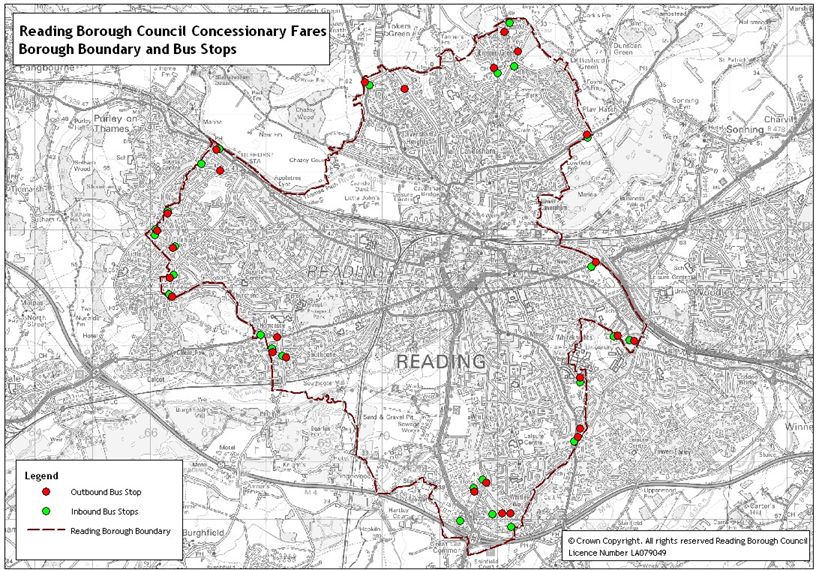
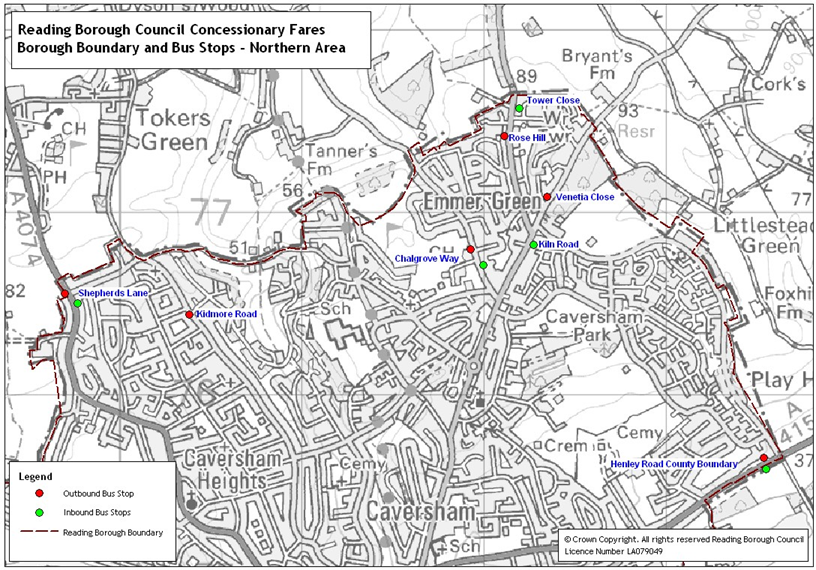
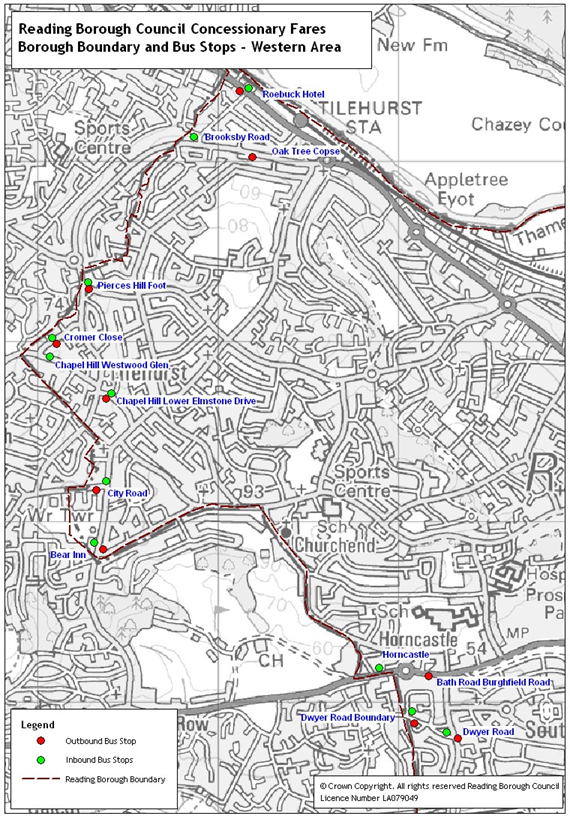
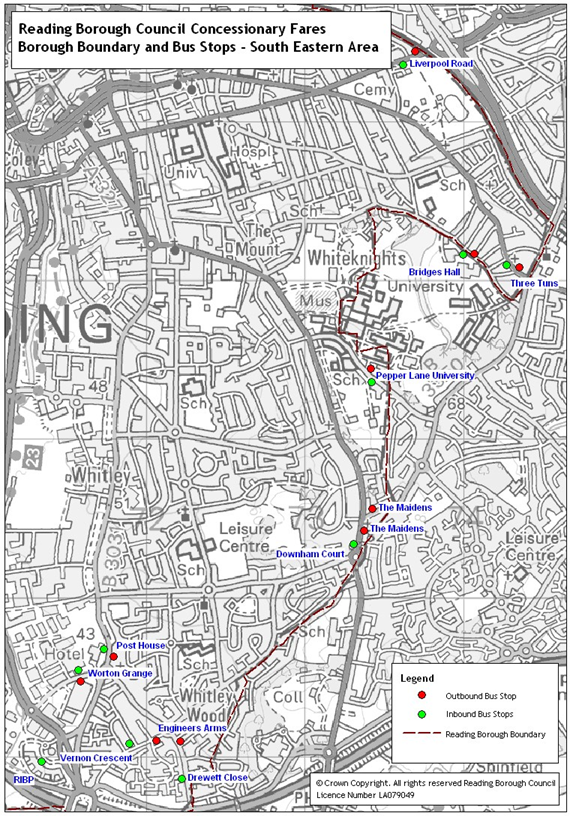
Schedule 2
Examples of Reading Borough Council/English National Travel concession scheme passes
NB All ENCTS passes are smart cards and operators with appropriate ticket machines can use automated validation and recording facilities. Otherwise the pass may be validated by inspection of the holder details and photograph.
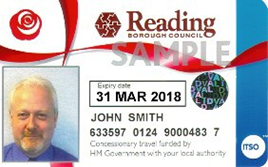
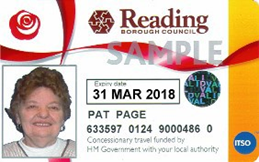
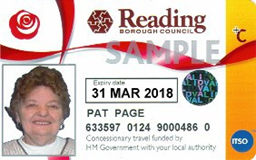
This pass is a standard Access pass, with additional Companion entitlement, denoted by the ‘+C’ notation in the orange strip on the right hand edge of the card. The card is encoded with the Reading Borough variant of the ITSO national product for ENCTS eligible disabled passes. The pass is also encoded with a local Reading Borough Council registered ITSO product, which can be used to record Companion trips. Operators who have a smart ticketing system and would like to make use of this product should contact ITSO or the Council for more information.
Schedule 3
